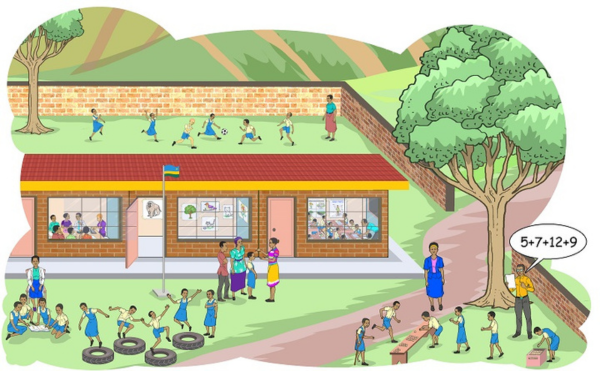Children learn as they play
September 27th, 2023
Many people don’t understand how play can be used in learning. Surprisingly some parents and learners think it is a waste of time.
When I was in primary school, I used to sit in the classroom from 8:00 a.m. to 4:30 p.m., copying notes and following the teacher on the blackboard. Back then, I thought it was okay, even though it was boring. My teacher didn’t know any other teaching methods, so I had to endure it, and it shaped who I am today.
Now, there’s another way of teaching and learning known as “Learning through Play.” Many people may not understand how play can be used for learning, but, in fact, all subjects taught in primary school can be learned through various forms of play. It’s not only more effective but also more enjoyable! That’s why the Rwandan Education Board (REB), in collaboration with the Canadian NGO “Right to Play,” has developed an online course for lower primary school teachers (P1, P2, P3) to teach them how to incorporate “Learning through Play” in their teaching. This course explains what play is, why it’s crucial for young children’s development, and how it can be integrated into classroom teaching.
Three Mountains won the contract to digitize this e-course. When I began working on it, I had no prior knowledge of Learning through Play, but now, I absolutely love it. I wish I could go back to Primary 1 and Learn through Play.
The project became even more exciting when we visited “Bright School” in Muhanga, a school entirely based on Learning through Play. It was truly inspiring to see students playing various games while learning different subjects.
Learners have the opportunity to engage in various activities such as building a house, acting out stories, preparing meals, or creating paper crafts using materials available at school or brought from home. All of these playful activities contribute to the acquisition of skills such as mathematics, Kinyarwanda, English, creative arts, physical education, set, and others. During play, children also develop social skills, such as teamwork, leadership, creative thinking, and problem-solving. Teachers are encouraged to allow learners to take charge of their own learning process while closely observing and providing guidance to ensure their safety.
During this assignment, I have come to realize that implementing Learning through Play can pose challenges, especially when there are many learners. However, it is possible to organize a well-structured classroom environment that provides learners with dedicated spaces for different kinds of play. Additionally, allowing them to play outside in a free space can also be beneficial. By creating an environment that supports play, learners can engage in meaningful and enjoyable learning experiences.
Learners learn best through discovery rather than simply being told facts. It is easier to remember what you have experienced than to memorize information from a blackboard or notebook. The hands-on and interactive nature of play helps to solidify knowledge and make it more memorable.
Though the work was challenging, everyone on our team thoroughly enjoyed creating these engaging courses and we will make sure our children learn using this approach.
Clemence Ineza

